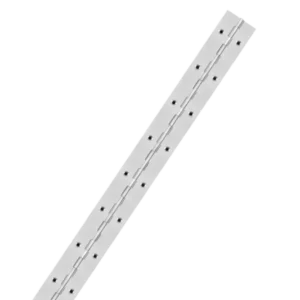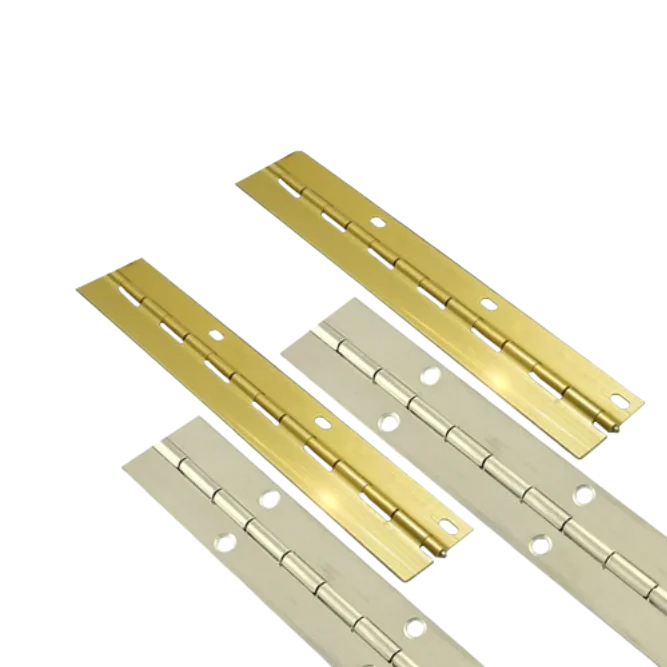What is a continuous piano hinge?
Continuous piano hinges, also known as piano hinges, are long, continuous hinges that run the entire length of the door or panel they are attached to. This design provides consistent and even support across the length of the hinge, making it ideal for applications that require robust and reliable pivoting.
Originally designed for piano lids, these hinges are now used in a variety of applications due to their durability and even distribution of weight. They provide robust support and smooth operation, making them ideal for numerous industries.
What kind of material is continuous piano hinge made of ?
When it comes to continuous piano hinges, the choice of material is crucial. Common materials include Iron, SUS 201, and SUS 304 stainless steel. Each material offers distinct advantages and is suitable for different environments and applications.
Comparing Materials: Iron, SUS 201, and SUS 304
Iron Continuous Piano Hinge:
• Strength: Iron hinges are known for their strength and rigidity, making them suitable for applications where heavy-duty support is required.
• Cost: Iron hinges are typically more cost-effective compared to stainless steel options.
• Corrosion Resistance: However, iron hinges are susceptible to rust and corrosion over time, especially in humid or outdoor environments.
• Best Uses: Iron continuous piano hinges are commonly used in indoor applications where cost is a primary concern and exposure to moisture is limited. They are ideal for light-duty applications where strength and low cost are prioritized.

SUS 201 Continuous Piano Hinge Stainless Steel:
• Corrosion Resistance: SUS 201 stainless steel offers better corrosion resistance than iron, although it is not as resistant as SUS 304.
• Strength: It provides high strength and durability, making it suitable for applications that require a stronger hinge than iron.
• Aesthetic Appeal: SUS 201 stainless steel has a clean, modern appearance that enhances the visual appeal of installations.
• Best Uses: SUS 201 stainless steel continuous piano hinges are often chosen for applications where moderate corrosion resistance and affordability are important factors. They are suitable for environments with low to moderate exposure to moisture and chemicals.
SUS 304 Stainless Steel Continuous Piano Hinge:
• Material Characteristics: Superior Corrosion Resistance: SUS 304 stainless steel is highly resistant to rust, corrosion, and staining, even in harsh environments such as marine or industrial settings.
• Durability: It offers exceptional strength and durability, capable of withstanding heavy loads and frequent use without compromising performance.
• Aesthetic Appeal: SUS 304 stainless steel has a polished finish that maintains its appearance over time, making it suitable for applications where aesthetics are important.
• Best Uses:SUS 304 stainless steel continuous piano hinges are ideal for high-traffic areas, outdoor installations, and environments exposed to moisture, chemicals, or saltwater. They are chosen for applications where long-term performance and minimal maintenance are critical.

How to Choose the Right Continuous Piano Hinge
Selecting the appropriate continuous piano hinge involves evaluating factors such as:
• Environmental Conditions: Consider the level of exposure to moisture, chemicals, or outdoor elements.
• Load Requirements: Determine the weight capacity needed for the hinge to support.
• Budget and Longevity: Balance initial costs with long-term durability and maintenance requirements.
Benefits of Continuous Piano Hinge Stainless Steel
Stainless steel, especially SUS 304, is a preferred choice for continuous piano hinges due to its numerous benefits:
• Corrosion Resistance: Stainless steel is highly resistant to rust and corrosion, making it suitable for both indoor and outdoor applications.
• Durability: It offers excellent strength and longevity, ensuring the hinges can withstand heavy use.
• Aesthetic Appeal: Stainless steel has a sleek, modern look that enhances the appearance of any installation.
• Low Maintenance: It requires minimal upkeep, retaining its functionality and appearance over time.
Applications of Continuous Piano Hinge Stainless Steel
Continuous piano hinge Stainless Steeel finds diverse applications across various industries, including:
• Commercial and Residential Doors: Providing robust and reliable support for door panels.
• Industrial Equipment and Machinery: Ensuring durable operation in heavy machinery and equipment.
• Marine and Automotive Industries: Resisting corrosion from saltwater and harsh environmental conditions.
• Medical and Healthcare Equipment: Offering hygienic and durable solutions for medical cabinets and equipment.

Comparison with Other Types of Hinges
Continuous piano hinges offer distinct advantages over traditional hinges:
• Even Distribution of Weight: Distributes weight evenly along the length of the hinge, reducing stress on the door or panel.
• Durability and Longevity: Provides robust support and durability, minimizing wear and extending lifespan.
• Versatility: Suitable for a wide range of applications from doors to machinery, offering consistent performance.
Stainless steel continuous piano hinges contribute to sustainability through:
• Recyclability: Stainless steel is fully recyclable, minimizing environmental impact and reducing waste.
• Long-Term Use: Extends product lifespan, reducing the need for replacements and conserving resources.
Installation Tips for Continuous Piano Hinges
Proper installation is essential for optimizing the performance and lifespan of continuous piano hinges:
1. Preparation: Ensure the door or panel is properly aligned and prepared for hinge installation.
2. Alignment: Align the hinge accurately with markings or guidelines to ensure smooth operation.
3. Secure Fastening: Use appropriate screws or fasteners to secure the hinge firmly in place.
4. Testing: Test the hinge for smooth movement and ensure it supports the weight without binding or sagging.
Maintenance and Care for Continuous Piano Hinge
Maintaining continuous piano hinges ensures prolonged performance and aesthetic appeal:
• Regular Cleaning: Clean hinges with mild soap and water to remove dirt and debris, especially in high-use areas.
• Inspection: Periodically inspect hinges for signs of wear, corrosion, or loose fasteners.
• Lubrication: Apply a silicone-based lubricant to pivot points to maintain smooth operation and prevent friction.
Frequently Asked Questions (FAQs) about Continuous Piano Hinge
Q: What are the benefits of SUS 304 stainless steel continuous Piano hinge over other materials?
A: SUS 304 offers superior corrosion resistance, durability, and aesthetic appeal, making it ideal for demanding environments.
Q: Can stainless steel hinges be used outdoors?
A: Yes, SUS 304 stainless steel hinges are specifically designed to withstand outdoor conditions, including exposure to moisture and saltwater.
Q: How do I determine the appropriate size of continuous piano hinge for my application?
A: Measure the length and width of the door or panel, ensuring the hinge matches the dimensions and weight requirements.
Q:How do you size a continuous hinge
A: Size a continuous hinge can follow the steps below
1.Measure the Door or Panel:
• Length: Measure the full height of the door or panel. • Width: Measure the width of the door or panel where the hinge will be mounted.
2.Choose the Length of the Hinge:
• Select a continuous hinge that matches or exceeds the measured height of the door or panel.
3.Consider Weight Capacity:
• Ensure the hinge can support the weight of the door or panel without strain.
4.Select the Width of the Hinge:
• Choose a hinge width that provides adequate support and stability for the door or panel.
5.Check Installation Requirements:
• Verify compatibility with the mounting surface (wood, metal).
• Allow sufficient clearance for smooth opening and closing.
6.Consult Manufacturer Guidelines:
• Review specific recommendations from the hinge manufacturer regarding size and installation.
7.Installation and Adjustment:
• Trim the hinge if necessary to fit using appropriate tools.
• Securely fasten the hinge to the door or panel and frame.

By understanding the differences between Iron, SUS 201, and SUS 304 stainless steel continuous piano hinges, people can make an informed decision based on the specific application needs, environment, and budget. Each material offers unique benefits that contribute to the functionality, durability, and aesthetic appeal of installations.
E-Star hardware supply high quality continuous piano hinge stainless steel with various thickness, width and length.Explore our range of durable and versatile hinge and get the competitive price for you only.